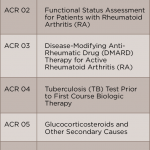New research presented at ACR Convergence 2025 highlights how the Rheumatology Informatics System for Effectiveness (RISE) Registry—the nation’s largest collection of electronic health record data from rheumatology practices—is driving transformative improvements in quality, safety and outcomes in patients with rheumatic and musculoskeletal diseases.
Research studies reveal that participation in and engagement with RISE not only elevate quality performance metrics, but also power real-world insights into treatment patterns, disparities and emerging therapies.
Several abstracts using RISE data illustrate the registry’s broad research utility:
- GLP-1 receptor agonists demonstrates meaningful improvements in weight loss, pain, disease activity and function among rheumatology patients, confirming the potential of metabolic agents in musculoskeletal health.
- Bone Health in Patients with Gout Using Real-World U.S. Data identifies opportunities for proactive screening and prevention of fragility fractures, a previously underrecognized issue in gout populations.
- Safety and medication management studies, including Thirty Percent of Older Adults with Rheumatic Disease Receive High-Risk Medication and More than 40% of Older Adults with Rheumatic Diseases Are Prescribed Opioid Medications, reveal persistent risks, emphasizing the need for monitoring strategies supported by registry data.
- Research into Sex Differences in Medication Discontinuation in Axial Spondyloarthritis underscores gender variations in persistence and response to therapy, highlighting personalized medicine opportunities.
- Implementation-focused abstracts, such as What Works? A Consolidated Framework for Implementation Research-Guided Exploration of Patient Safety in Rheumatology Practices, showcase how RISE data guide patient safety improvements in clinical workflows.
In addition, new analyses demonstrate RISE’s impact on investigating equity and outcomes:
- Assessing for Racial/Ethnic Variability in U.S.-FRAX™ Performance Among Older Adult Women with Rheumatoid Arthritis revealed disparities in fracture risk estimation tools, prompting calls for model recalibration.
- Development of the ACR Implementation Guide for Integrating Patient-Reported Systemic Lupus Erythematosus Quality Measures strengthens national efforts to systematically incorporate patient-reported outcomes into lupus care quality benchmarking.
These abstracts collectively demonstrate RISE’s vital role as a data-driven engine accelerating research and quality improvements throughout the rheumatology community. The RISE Registry will transition to a new vendor in January 2026, introducing enhanced capabilities that will broaden data capture, deepen analytic insights and streamline national reporting efforts. This upgrade promises to amplify RISE’s impact on research and clinical care.
Come by the RISE booth in the Exhibit Hall at ACR Convergence 2025 for a live demonstration and explore all the RISE-related abstracts at https://acrabstracts.org.



